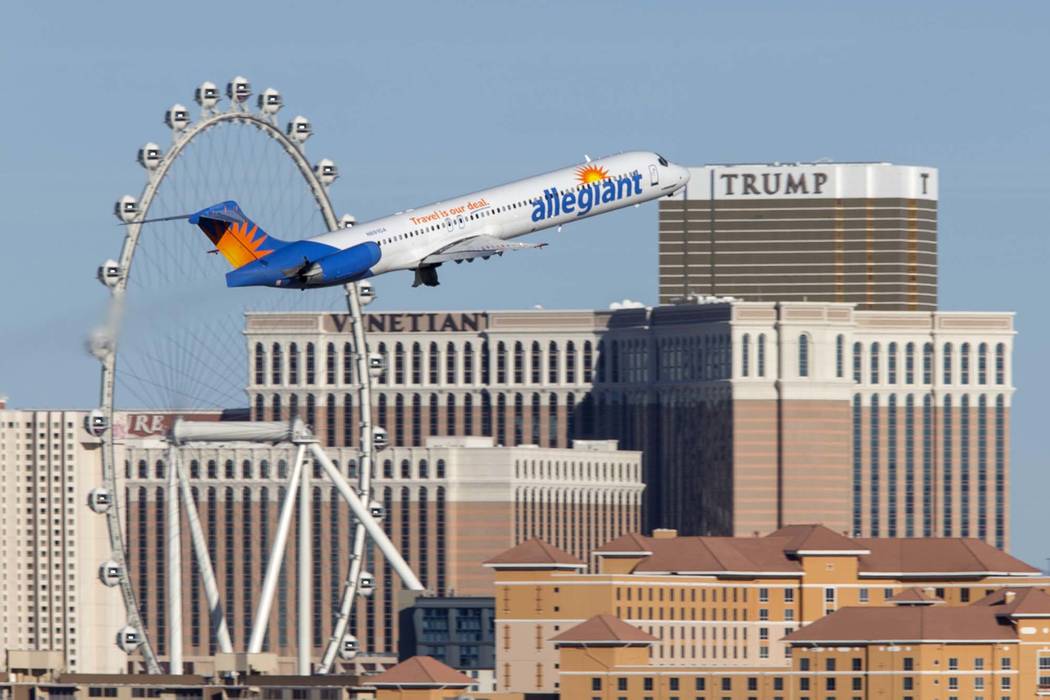Allegiant Air asks judge to prevent pilots from striking

Allegiant Air is asking a federal judge to rule that a strike threatened by the pilots’ union is unlawful as the Las Vegas-based budget carrier attempts to avoid a walkout that could affect thousands of passengers during the summer travel season, company officials said Tuesday.
Earlier this month, about 95.5 percent of the pilots represented by Teamsters Local 1224 voted in support of a strike amid allegations that Allegiant had stalled efforts to update its scheduling system.
Allegiant filed a complaint in U.S. District Court, District of Nevada, requesting a declaratory judgment that a strike by the pilots would be illegal under the Railway Labor Act and the terms of an employee contract reached two years ago with the Teamsters union.
Both the federal law and the union contract require both sides to exert every effort to settle their disputes before moving toward a strike.
“Our customers look forward to long-planned vacations and the (Teamsters’) unnecessary actions have resulted in many of our customers thinking their travel plans are at risk,” Scott Sheldon, Allegiant’s executive vice-president, said in a statement. “The Teamsters have left us no choice but to take this action.”
The dispute centers on how Allegiant schedules its pilots through an in-house system based on the carrier’s “must-fly” days, which require all pilots at a particular base airport to fly regardless of their seniority with the company.
As a result, Teamsters officials have said that the senior pilots might not receive their preferred days off. Allegiant’s system runs counter to seniority-based scheduling methods adopted by nearly all other air carriers.
A union spokeswoman said Tuesday that the Teamsters have not yet received a copy of the court documents filed by Allegiant.
The issue was supposed to be resolved within 180 days of the first labor pact signed by Allegiant and the Teamsters union in August 2016, said Andrew Robles, an Allegiant captain who serves as chairman of the union’s executive council.
“For two years, we have seen management delay progress and renege on agreements it previously made,” Robles said in a statement. “We are disappointed, but not surprised, to learn that management has chosen to continue this approach by hiding behind a frivolous lawsuit.”
Allegiant executives on Tuesday said the dispute was “minor” and could be resolved through grievance and arbitration procedures outlined by the Railway Labor Act and the current union contract.
Company officials also said they’ve “committed a significant amount of time and resources” working with a vendor known as Crewing Solutions to develop, test and launch a new scheduling program “in the near future.”
“Crew scheduling software is highly sophisticated and complex by nature, and requires specific customizations to match the needs of each particular client, and to properly integrate with the company’s other systems,” Crewing Solutions CEO James Fasso said in a statement issued by Allegiant.
This isn’t the first time tensions have escalated between Allegiant and the Teamsters union amid the lengthy dispute over the pilots’ scheduling system.
A strike was averted in May 2015, when U.S. District Judge Andrew Gordon issued a preliminary injunction that cited a potential violation of the Railway Labor Act if Allegiant’s pilots had walked off the job.
Gordon’s ruling also stated that a strike would have caused irreparable harm to Allegiant, with a shutdown costing the airline an estimated $7.7 million per day.
Contact Art Marroquin at amarroquin@reviewjournal.com or 702-383-0336. Find @AMarroquin_LV on Twitter.